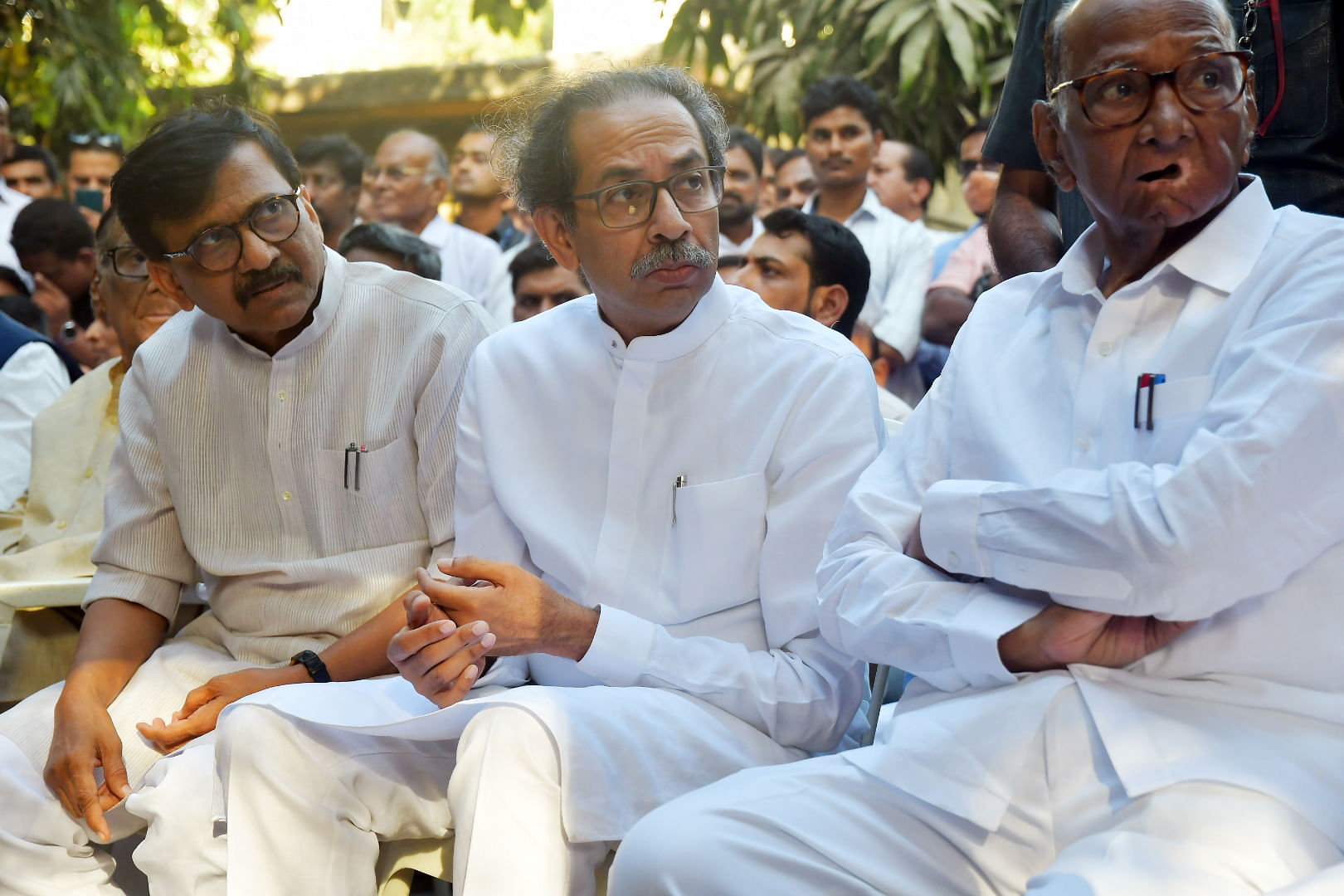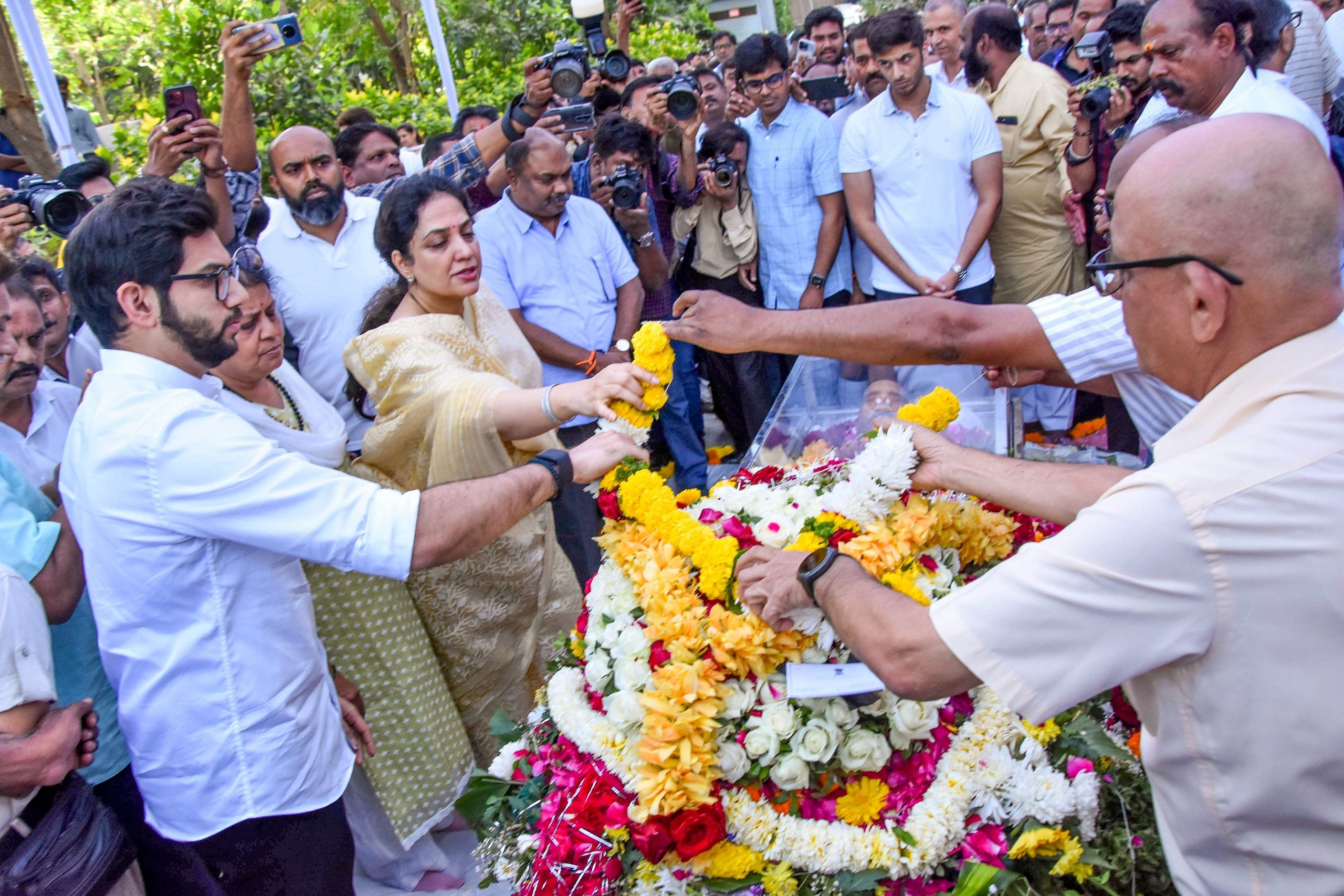Mumbai: Shiv Senaâs Manohar Joshi rarely ever missed a single political programme in Mumbaiâs Girgaum, the central part of south Mumbai and a Marathi heartland. As Arvind Nerkar, a former MLA from the neighbourhood, recalls, Joshi, a former chief minister of Maharashtra, would joke that the road to any major political edifice in Mumbai, whether it is the Mumbai civic body, Mantralaya or even Raj Bhavan representing the Centre, goes through Girgaum â figuratively and literally.
Going by Joshiâs words, his commitment to Girgaum definitely paid off. Joshi is one of the few politicians whose biographical sketch has almost everything a politician aspires to be â corporator, mayor, MLA, MLC, Lok Sabha MP, Rajya Sabha MP, chief minister, Union minister, and Lok Sabha Speaker.Â
Joshi died at about 3 am Friday following a cardiac arrest after having lived a political life full of firsts. He was 86.
Joshi was among the first rung of the undivided Shiv Senaâs leaders. He was Maharashtraâs first non-Congress CM and first Brahmin CM. He was also Maharashtraâs first CM to pave the way for private sector participation in public infrastructure creation.Â
A loyalist of Bal Thackeray, Joshi was resigned to his destiny as the Shiv Sena founderâs pawn but had his share of clashes with the latterâs son Uddhav Thackeray.Â
On Friday, Uddhav Thackeray, speaking to reporters, said, âYes, Manohar Joshi was CM, he was the speaker of the Lok Sabha, he was a Union Minister. But, most importantly, he was a real Shiv Sainik. In every personâs or partyâs life, there are always ups and downs. But, even during difficult days, he stayed with the Shiv Sena chief Balasaheb Thackeray with loyalty.â

Also Read: Why Narayan Rane, largely muted over past 5 years, is questioning Shinde govt on Maratha quota
A Shiv Sainik who stood out
Right till the end, Joshi never clarified which side of the Shiv Sena he was on â whether with Eknath Shinde, who rebelled in 2022 with a majority of MLAs claiming to be the real Shiv Sena and the real legatee of Bal Thackerayâs ideology, or with Uddhav Thackeray, the Shiv Sena founderâs legatee by birth.
Shinde had visited Joshi at his residence about a month after taking charge as CM of the new government of the Bharatiya Janata Party and his faction of the Shiv Sena.Â
Talking about the meeting in July 2022 Friday, Shinde said to reporters: âAfter I became CM I went to meet him. He put his hand on my back and gave me his blessings. He also gave me some guidance on how to run the government.â
Joshi was born in the Nandvi village in the Raigad district in a poor family of âMadhukarisâ (religious mendicants) and always had a penchant for education, becoming an entrepreneur and pulling himself out of his familial poverty, Shiv Sena leaders who have known Joshi for years say.Â
And he worked towards what he coveted. As his village lacked the requisite educational facilities, Joshi moved out and completed his higher education in Panvel and later Mumbai. He pursued an MA and a law degree and even did a PhD from the Mumbai University on the Shiv Sena.
Joshi was an entrepreneur-academician and founded the Kohinoor Technical Institute, which grew to have several branches across Maharashtra. His academic association earned him the moniker âsir,â with even an average Shiv Sainik identifying Joshi as âJoshi sir,â Sena leaders known to him say. Â
Joshiâs Kohinoor later forayed into hospitality and real estate as well.
In many ways, he was very unlike the quintessential aggressive street-thumping Shiv Sainik of the day, political commentator Hemant Desai told ThePrint.
âManohar Joshi was soft-spoken and demure in his mannerisms, though he was always well-spoken. There is another reason why he stood out. At a time when the Shiv Sena was making noise about the need for Marathi manus to get employment opportunities in Mumbaiâs businesses, here was a chief Sena leader who was creating businesses,â Desai said.
Joshi joined the Shiv Sena in March 1967, eight months after the party was established. He rose in politics to be Bal Thackerayâs right-hand man and became a corporator in the Mumbai civic body in 1968 and the Mumbai mayor in 1976.
âIn 1985, in the partyâs convention at Mahad, Balasaheb had appointed the very first âsampark pramukhsâ for the party. At that time, Joshi sir was given the responsibility for the Raigad district,â Gajanan Kirtikar, a Sena old-timer and Lok Sabha MP who has now sided with the Shinde-led Shiv Sena, told ThePrint.
Kirtikar said Joshi is identified as the cultured, soft-spoken, and calm face of the Shiv Sena, a party that is otherwise defamed as having hooligan tendencies.Â
âBut, though he was a teacher by profession and soft-spoken by nature, he always kept the aggressive and rebellious Shiv Sainik in him alive,â the MP added.
Balasahebâs CM
Joshi was among Bal Thackerayâs close confidantes, being often referred to by the Sena supremo as âManohar Pantâ, although he has also very publicly been a recipient of the party founderâs ire. Joshi would at times make light of the criticism on public fora, but never flinched or spoke out, analysts say.
Joshi first became an MLC in 1972 and an MLA in 1990. In 1995 he created a record for being the first non-Congress CM of Maharashtra and also the first Brahmin CM of the state.
Political commentator Desai said: âUnder Manohar Joshi as CM, the Maharashtra government entered into an MoU with the Hindujas, but when Bal Thackeray heard about it, he was upset that he had not been consulted. Balasaheb would always maintain that he can make anyone CM,\ and that he has made Manohar Joshi the CM, but the reins of the government are in his hands. Joshi took in these statements silentlyâ.
As CM of the first government of the Shiv Sena-BJP alliance, Manohar Joshi also had to efficiently manage leaders from both sides of the coalition. Sena sources say Joshi had a good equation with BJPâs Pramod Mahajan, but could often not see eye-to-eye with Gopinath Munde.Â
âBalasaheb Thackeray and Pramod Mahajan were both there at the time, and they were both out of the government. They would handle the alliance relations at their level. But Manohar Joshi and Gopinath Munde had their share of differences as CM and Deputy CM. The conflicts were mainly over policy issues, priorities of the government, and the style of functioning,â Atul Bhatkhalkar, BJP MLA from Kandivali East assembly, told ThePrint.
It was during Joshiâs tenure as CM that the Maharashtra government started its ambitious slum rehabilitation scheme, giving free housing to slum dwellers living in huts before 1995. The cut-off was eventually extended by the subsequent Congress-NCP government to 2000.Â
The Joshi-led Shiv Sena-BJP government also brought in private capital for public infrastructure development. Nitin Gadkari, who helmed the state public works department portfolio, had convinced the then CM to set up the Maharashtra State Road Development Corporation and build the Mumbai-Pune expressway on a public-private partnership model.
Joshiâs tenure as CM came to an abrupt end in 1999 when Bal Thackeray asked him to resign without assigning any reason whatsoever. The Sena chiefâs orders, however, followed a political controversy involving Joshiâs son-in-law Girish Vyas. It was alleged hat a prime plot on Puneâs Prabhat Road, meant for a school, was de-reserved to favour a company that Vyas owned to construct a housing complex.
Also Read: Eknath Shindeâs bridge to Jarange-Patil: dialogue through OSD, help from personal coffers
Clashes with Bhujbal, Rane, Uddhav
During his nearly six-decade-long political career with the Shiv Sena, Joshi clashed with a few leaders who ended up being Sena rebels. In 1991, Chhagan Bhujbal, now a leader of Ajit Pawarâs faction of the Nationalist Congress Party, was upset over Bal Thackeray choosing Joshi as the Opposition leader and walked out of the party. Joshi had his share of differences with Narayan Rane too, who left the party in 2005.Â
Rane is now a BJP leader.
But, in the sunset years of his clout with the Shiv Sena, Joshi, once the right-hand man of Bal Thackeray, clashed with a Thackeray himself â son and heir apparent Uddhav Thackeray.
In September last year, Sada Sarvankar, an MLA from the Shinde-led Shiv Sena made a sensational claim in a purported video that went viral. He said Uddhav Thackeray and Sanjay Raut, now Rajya Sabha MP, had incited him to attack Joshiâs Shivaji Park residence in 2009.
Though the statement was hardly backed by any evidence, it didnât come across as entirely unhinged. Everyone in Maharashtraâs political corridors has seen differences between Joshi and Uddhav Thackeray play out, more so after Bal Thackerayâs death in 2012.

âIt is difficult to pinpoint exactly what happened, but Uddhav Thackeray sidelined Manohar Joshi. The process had started when Bal Thackeray was alive. In the few years before Bal Thackerayâs death, Manohar Joshi had slowly started losing party positions too,â political commentator Prakash Bal told ThePrint.
âIn fact, the original idea in 1995 was to make Manohar Joshiâs uncle, Sudhir Joshi, the CM. His name was strongly doing the rounds, but for reasons unknown, Manohar Joshi was chosen instead,â Bal said.
The supposed differences between Uddhav Thackeray and Manohar Joshi reached a peak in 2013 when Joshi, who had attended all rallies seated right next to Bal Thackeray, was booed off the dais by a section of Shiv Sainiks during the partyâs annual Dussehra rally. Supporters of Uddhav within the party were said to be upset with Joshiâs remarks a few days earlier â he had said that the Shiv Senaâs leadership under Uddhav Thackeray was not as aggressive as under Bal Thackeray.Â
Eventually, Joshi apologised to his party members for his remarks about Uddhav Thackeray, but gradually withdrew from party affairs.
âIt is not that he disassociated himself from the Shiv Sena. But, he was getting old and tired in public life,â a Sena leader close to Uddhav Thackeray told ThePrint.
The leader added that it was still a full life by any measure.
Going by what Joshi had said in an interview with IBN Lokmat in 2013, the former CM would have tended to agree.Â
In that interview, Joshi said there are âthree things that one must have in order to be happy in life.â The first, he said, is knowledge. The second is business and a sound financial position, and the third is a happy family life.
âFortunately, I had all these three thingsâ¦Sometimes when I look back I wonder is this really my life? I have had so much success in life. I need to remember and thank Balasaheb,â he added.
(Edited by Uttara Ramaswamy)
Also Read: Explaining speakerâs verdict in Marathi, presenting documents â how Uddhav is going to âpeopleâs courtâ

